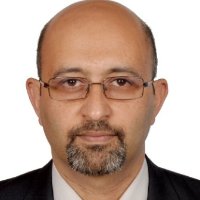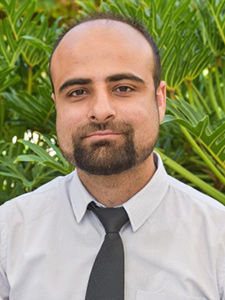| Schedule | October 2, 2018 |
| Session 1: 8:30am-10:30am | Introduction to PLS-SEM using SmartPLS and WarpPLS by Dr. S. Mostafa Rasoolimanesh |
| Session 2: 10-:45am- 12:45pm | Mediator – Moderator Using PLS-SEM; WarpPLS and SmartPLS by Dr. S. Mostafa Rasoolimanesh |
| 1:00pm-2:30pm | Lunch |
| Session 3: 3:00pm-5:00pm | How to Publish Successfully by Dr. Faizan Ali |
GLOSEARCH Conference registration gives access to ANAHEI Research Academy. If you want to register only for the ANAHEI Academy, please register here ($100).
Participants will receive a certificate from ANAHEI & USF & Hoa Sen University if they attend all three sessions.
 Dr. S. Mostafa Rasoolimanesh is a Senior Lecturer at the Faculty of Hospitality, Food & Leisure Management, Taylor’s University. He has published several articles in high impact SSCI journals such as; Tourism Management, Journal of Travel Research, Journal of Sustainable Tourism, International Journal of Contemporary Hospitality Management, Cities, Habitat International, and International Journal of Tourism Research among others. Most of his published papers utilize PLS-SEM method using WarpPLS and SmartPLS software Packages. Dr. Mostafa has recently collaborated with a number of well-known scholars in PLS such as Prof. Ned Kock (developer of WarpPLS software), Prof. Christian Ringle (Developer of SmartPLS software), Prof. Marko Sarstedt, and Prof. Jose L. Roldan and their work have been published in top-tier journals. In addition, Dr. Mostafa has conducted several workshops on PLS-SEM.
Dr. S. Mostafa Rasoolimanesh is a Senior Lecturer at the Faculty of Hospitality, Food & Leisure Management, Taylor’s University. He has published several articles in high impact SSCI journals such as; Tourism Management, Journal of Travel Research, Journal of Sustainable Tourism, International Journal of Contemporary Hospitality Management, Cities, Habitat International, and International Journal of Tourism Research among others. Most of his published papers utilize PLS-SEM method using WarpPLS and SmartPLS software Packages. Dr. Mostafa has recently collaborated with a number of well-known scholars in PLS such as Prof. Ned Kock (developer of WarpPLS software), Prof. Christian Ringle (Developer of SmartPLS software), Prof. Marko Sarstedt, and Prof. Jose L. Roldan and their work have been published in top-tier journals. In addition, Dr. Mostafa has conducted several workshops on PLS-SEM.
 Dr. Faizan Ali received his PhD in Marketing from the International Business School, Universiti Teknologi Malaysia (UTM-IBS) in June 2015. Dr. Ali also holds an undergraduate degree in Business Administration and Information Technology [BBA-IT (Hons)] with distinction from Institute of Management Sciences, University of Peshawar, Pakistan, and a Masters in Management with a dissertation on consumer behaviour in airline industry from Glyndwr University, United Kingdom.
Dr. Faizan Ali received his PhD in Marketing from the International Business School, Universiti Teknologi Malaysia (UTM-IBS) in June 2015. Dr. Ali also holds an undergraduate degree in Business Administration and Information Technology [BBA-IT (Hons)] with distinction from Institute of Management Sciences, University of Peshawar, Pakistan, and a Masters in Management with a dissertation on consumer behaviour in airline industry from Glyndwr University, United Kingdom.
Dr. Ali’s research interests are in the areas of customer experience, service performance and quality, customer satisfaction and behaviour. Dr Ali is also enthusiastic about developing new scales and working on various methodological aspects of hospitality and tourism research. He has authored more than 70 international refereed journal articles and international conference papers. His recent research has been accepted and published in top tier internationally-refereed journals and a recipient of multiple research-based awards. Dr. Ali is an active member of academic hospitality associations. Currently, he serves as the Coordinating Editor for International Journal of Hospitality Management, Assistant Editor (Methodology) for International Journal of Contemporary Hospitality Management and Journal of Hospitality and Tourism Technology. Dr. Ali is also Associate Editor for Journal of Global Business Insights. He also serves on the editorial boards of various other journals. Dr. Ali is a trained expert in usage of various statistical tools such as Structural Equation Modelling (SEM) and Partial Least Squares (PLS-SEM). He has also conducted SEM and Business Research Methods related workshops in USA, China, Taiwan, Malaysia and Pakistan.
Research Academy: Session 1
Introduction to Partial Least Squares – Structural Equation Modeling (PLS-SEM) Using SmartPLS and WarpPLS Software Packages
SEM is a statistical approach to analyze a hypothetical framework simultaneously. It allows a researcher to test and develop theories, and to test the relationships between latent variables on the conceptual model. There are two types of SEM; the covariance-based technique (CB-SEM) and the variance-based or partial least squares SEM (PLS-SEM). CB-SEM is confirmatory in nature, whereas PLS-SEM can handle theory development and prediction. The PLS-SEM is a variance-based approach and aims to maximize the explained variance of the dependent latent constructs; whereas the CB-SEM aims to reproduce the theoretical covariance matrix. Therefore the PLS-SEM is preferred when the researcher wants to predict the construct and identify relationship between them. In addition, PLS-SEM can handle more complex model including formative, composite and reflective constructs. PLS-SEM has been applied in many studies in marketing, business, strategic management, and social science areas in recent years. However, a few numbers of tourism and hospitality researches have used this useful and powerful method. Most of the tourism studies were interested in traditional CB-SEM rather than PLS-SEM. Therefore, a PLS-SEM workshop can be very significant for tourism and hospitality researchers.
Outline of introduction talk on PLS-SEM:
- Basics of SEM
- Formative, composite, and Reflective Measurement Model
- Measurement Model Evaluation and Reporting
- 1. Reflective Constructs
(a) Reliability
(b) Convergent validity
(c) Discriminant validity
4. 2. Formative and Composite Constructs
(a) Redundancy analysis for formative and nomological assessment for composite
(b) Outer weight
(c) VIF
5. 1. Structural Model Analysis & Evaluation
5. 2. Assessment of structural model
(a) R2
(b) Path coefficient
(c) Effect size
(d) Q2
(e) Linear and non-linear models
Research Academy: Session 2
Mediator – Moderator Using PLS-SEM; WarpPLS 6.0 and SmartPLS 3.2.7 Software Packages
Many studies in management, psychology, social science, including hospitality and tourism rely on mediating and moderating variables. Mediating variables are behavioral, psychological, or social constructs that transmit the effect of one variable to another variable. Mediation is one way that a researcher can explain the process or mechanism by which one variable affects another. However, moderating variable are those which affect the strength or nature of the relationship between two other variables.
This session aims to explain the concepts and theories behind mediator and moderator and describes various forms of simple and complex meditors, moderators. Different methods to assess mediators and moderators will be discussed in this session. These assessments will be conducted in the context of partial least squares- structural equation modeling (PLS-SEM) using two powerful software packages namely; WarpPLS 6.0 and SmartPLS 3.2.7.
Mediation
- Introduce the simple mediation effect
- Review different methods of assessment of mediation effect
- Assessment of mediator using WarpPLS 6.0
- Assessment of mediator using SmartPLS 3.2.7
Moderation
- Introduce Moderation effect
- Interaction effect and Multi Group Analysis (MGA)
- Different methods to assess Interaction effect
- MGA using WarpPLS 6.0 and SmartPLS 3.2.7
(a) Different methods of invariance measurement testing
(b) Non-parametric MGA methods (Henseler’s MGA, Permutation,…)
5. Full Latent Growth Assessment as an alternative to moderator using WarpPLS 6.0
Research Academy: Session 3
How to Publish Successfully
Publication must be seen as an important, if not the most important, part of the research process. However, writing research papers for academic journals is not easy and is also very competitive. This session gives some tips and hints on how to shape a successful paper by explaining the reasons and motives behind publishing, finding the suitable journals, the publication process and how to position the research papers to make them more attractive.



